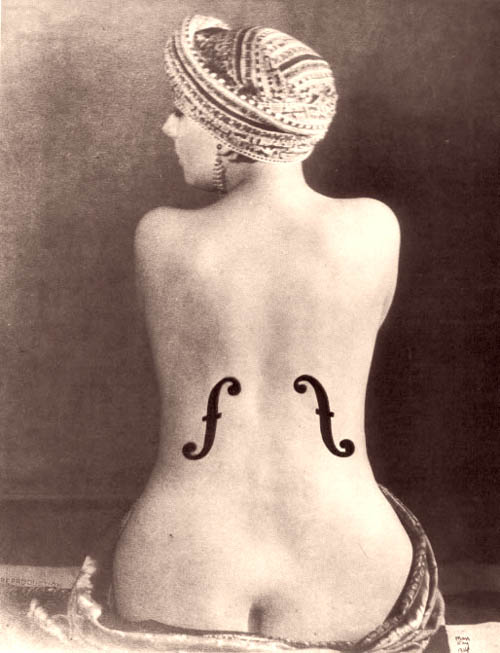| spynotes | :: | |
| February 22, 2006 Chamber music |
||
The cello has long been considered a sexy instrument. It�s curvaceous. It has a throaty voice, capable of both a growl and a wail. Moreover, in order to play the cello, one must straddle it. The most famous sexy cello picture is, of course, Man-Ray�s photo of Kiki of Montparnasse, her cello-shaped back emphasized with painted-on f-holes.
Nerve.com has taken the idea of cello as sexual to an extreme in this article, in which several cellists are solicited for sexual advice. One of the interviews also links to a site known as nakedcellist, which is nothing short of cello pornography. This is musical fetishism taken to heights heretofore unknown, at least to me. One of the questions nerve asks several of the cellists is what is the sexiest piece of cello terminology, the sexiest word. On cellist brings up general musical terminology, which becomes exotic merely for being Italian � �con tenerezza (with tenderness) or fortissimo (very loud).� Another cops out and cites the French horn technique of triple tonguing, which makes it sound like he�s been thinking about the question a little too much. No one brings up the aforementioned f-hole, which seems fairly obvious to me. Likewise the G-string. If you�re in junior high and playing a string instrument, you hope to God that your G-string never breaks, because you�ll be the butt of all jokes for months. Take it from one who knows. It is the tendency of jargon to make sexual terminology sound asexual and the benign (that word again!) sound erotic. This doesn�t seem to be a function of jargon so much as its unintentional result. There is something sexy about the mysterious, the things we don�t know. It�s intimate and exotic. I�ve been thinking about jargon (and you thought I was thinking about porn!) again today thanks to Metonym�s entry about her QP critique, in which she was criticized for being too journalistic. I have received the identical criticism on occasion, and while it can mean many things, sometimes it means that I don�t use enough jargon. There is a language of academia and I am expected to speak it. In general, I�m more interested in translation. I don�t see the point of using obscure words when the idea can be put more clearly and concisely another way. But there is also the matter of speaking to one�s audience. And if one�s audience expects jargon, then sometimes you have to cave. But I always feel a bit dirty when I do so. But the question remains why we as academics are so obsessed with this terminology. I am particularly speaking of the humanities, which, I think, makes a particularly egregious use of its language. I suspect, as I�m sure I�ve mentioned here before, that a lot of our obsession with this kind of language has to do with propping up our disciplines as scientific. Fundamentally, there�s nothing wrong with wanting to do more rigorous science-like work on humanities subjects, if it�s appropriate for the questions you ask. But focusing on the presence or absence of jargon is, of course, completely wrong-headed. We should be focusing on scholarly process and ideas. We�re paying attention to the wrong thing, distracted by language instead of engaged by it. The problem with focusing on language is that you get some horrific writing that throws around huge numbers of terms and citations, often hiding the fact that there is very little �there� there. Thus I tend to make the knee-jerk assumption that jargon-laden writing hides a lack of ideas. This is also not fair and not always true. Except when it is. Which is a lot, particularly with graduate student writing. The big problem is that our undergraduates usually don�t have enough background to tell the difference. They�ll waste tons of time on worthless articles because they sound important. The use of excessive jargon communicates much more about the author than about the thoughts he or she is trying to put across. I�ve always thought cellists looked a little more like insects than anything and else, their bodies replaced by a wooden carapace, arms and legs protruding angularly from its side. [Two entries yesterday; click back if you missed one.] |
||
| :: last :: next :: random :: newest :: archives :: | ||
| :: |
:: profile
:: notes
:: g-book
:: email
:: ::rings/links :: 100 things :: design :: host :: |
|
(c) 2003-2007 harri3tspy
<< chicago blogs >>

